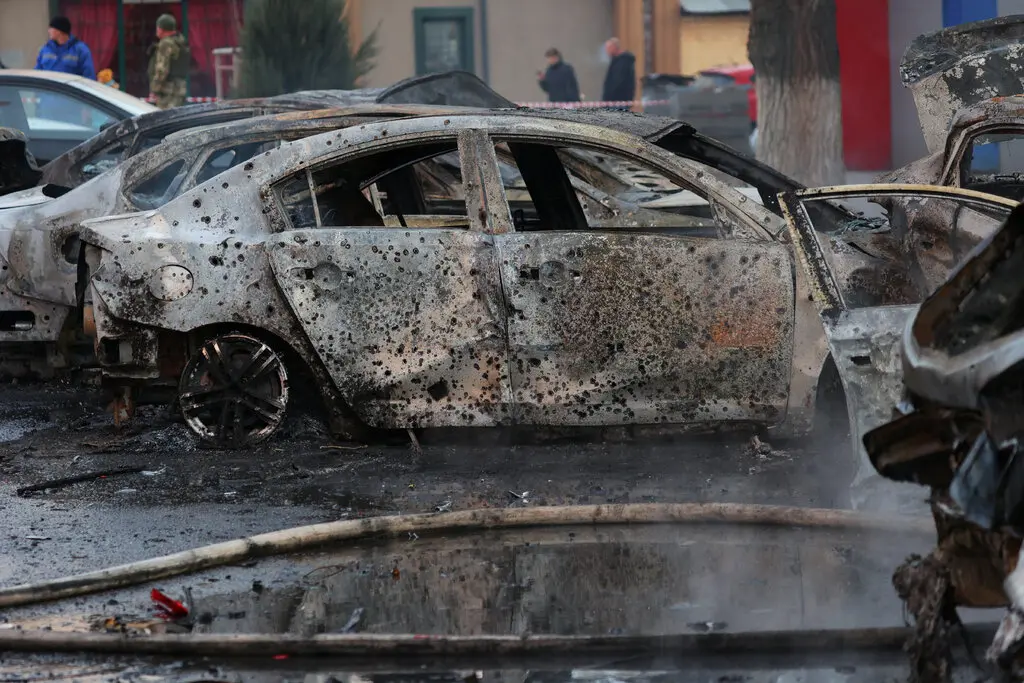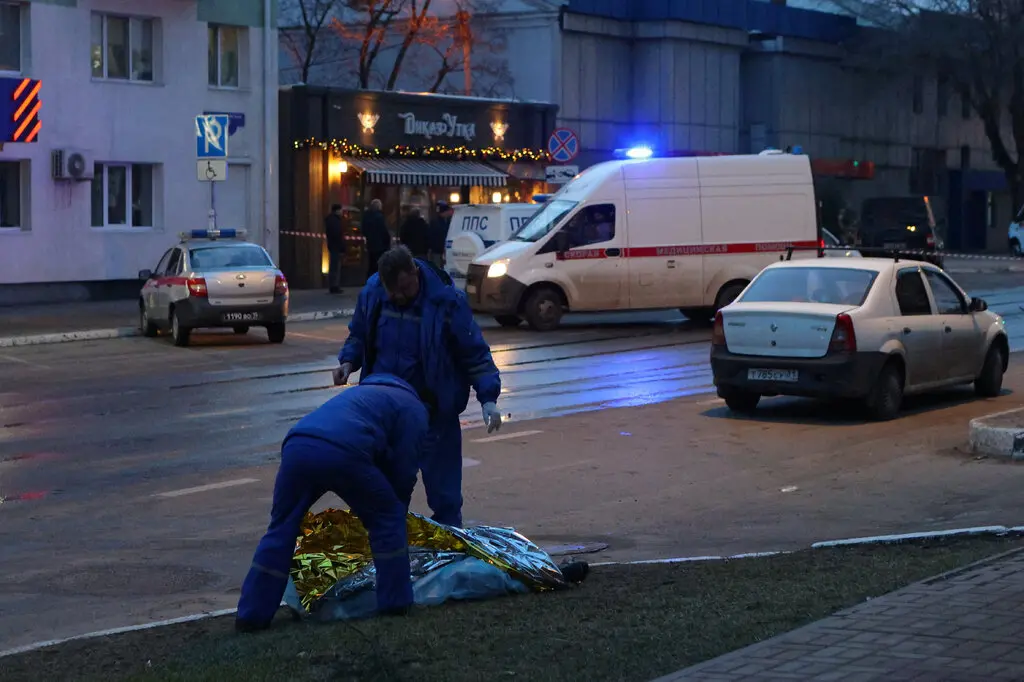On Saturday, Russian authorities reported that a Ukrainian assault on the city of Belgorod resulted in at least 22 fatalities and nearly 110 injuries. This marks the deadliest single attack on a Russian city since the conflict’s onset nearly two years ago, according to officials.
The Russian Defense Ministry stated that Ukraine targeted Belgorod, a regional center with approximately 330,000 residents situated about 25 miles north of the Ukrainian border, using two missiles and multiple rockets. The ministry described the strike as “indiscriminate” and noted that while most rockets were intercepted, some debris fell on the city. The Ukrainian government has not officially responded to the Belgorod attack, and the Russian claims have not been independently verified.
This assault appears to be Ukraine’s reaction to a substantial and lethal Russian air attack on its territory a day earlier, emphasizing Kyiv’s resolve to bring the war closer to Moscow. Ukrainian President Volodymyr Zelensky, in an address on Friday, vowed to continue efforts to “push the war back” to Russia.
Following the attack on Belgorod, Ukrainian officials reported several Russian strikes on the city of Kharkiv, about 40 miles away, indicating potential cross-border retaliation.
These consecutive assaults highlight the ongoing willingness of both Moscow and Kyiv to escalate the conflict, despite challenges such as Ukraine’s struggle to secure Western funding, increased war fatigue in Russia, and significant casualties on both sides. Andriy Yermak, the head of the Ukrainian president’s office, affirmed on social media that there would be consequences for all crimes, while Russia’s Defense Ministry stated that the Belgorod attack would “not go unpunished.”
While details of Saturday’s attack into Russia are not immediately clear, the substantial death toll underscores its significance. The violence in Belgorod, a city that has experienced repeated explosions over the past two years, disrupts the sense of relative normalcy that many Russians have maintained despite the ongoing conflict.

A burned out vehicle
For numerous Ukrainians, these strikes serve as a poignant reminder to Russia of the enduring suffering they have faced almost daily for nearly two years. Simultaneously, for many pro-war Russians, these attacks are seen as a justification for Moscow to employ even more aggressive tactics in Ukraine.
The Russian Emergency Situations Ministry shared a video depicting the aftermath of the bombardment, revealing cars ablaze, injured individuals seeking shelter, and shattered glass on the city’s buildings. Russian state television also aired videos posted by Belgorod residents, featuring plumes of smoke enveloping the city, broken glass near residential structures, and people lying on pavements—a stark parallel to scenes witnessed in Ukrainian cities like Kyiv, Lviv, and Dnipro the day before.
Vyacheslav Gladkov, the governor of the Belgorod region, disclosed that three children were among those killed on Saturday, and a residential area in the city center had been struck.
An emergency U.N. Security Council meeting was convened to discuss the attack, with Ukraine’s Western allies squarely attributing blame to the Kremlin, which initiated the war. “If Russia wants someone to blame for the deaths of Russians in this war, it should start with President Putin,” emphasized British envoy Thomas Phipps during the Council session.
In a previous Council meeting on Friday addressing Russia’s assault on Ukrainian cities, the United States, France, and Britain strongly condemned the attack.
Ukraine has repeatedly expressed its willingness to take the war to Russian territory, having previously targeted the Belgorod region with cross-border strikes and brief ground assaults involving Kyiv-backed, anti-Kremlin Russian fighters. These attacks have resulted in at least 50 deaths inside Russia, according to the United Nations, along with the evacuation of a few thousand civilians and minor clashes with the Russian military.

The attack killed at least 20 people.Credit...Reuters
The airstrike on Belgorod on Saturday was a retaliatory action by Ukraine in response to Russia’s extensive air assault on Friday against Ukraine, according to an official from Ukraine’s intelligence services, who spoke anonymously due to the sensitive nature of the topic. The official clarified that only military facilities were targeted in Ukraine’s counterattack. The assault on Ukraine, among the largest in the ongoing war, resulted in a minimum of 39 casualties, approximately 160 injuries, and substantial damage to civilian and military infrastructure.
As of Saturday, Ukrainian rescuers were still recovering bodies from the debris of a factory struck in central Kyiv, the capital, as reported by local authorities.
Furthermore, on Saturday evening, Ukrainian authorities disclosed that Russia initiated an assault on Kharkiv, Ukraine’s second-largest city, in what seemed to be a response to the Ukrainian attack. Oleh Syniehubov, the head of the Kharkiv region military administration, stated that Russian missiles from the Belgorod region targeted the eastern Ukrainian city, causing at least 28 injuries. He noted that the Russian military struck the city center six times, resulting in damage to residential buildings, shops, and a medical facility.
Unverified videos and images circulated on social media indicated that the Kharkiv Palace Hotel, a prominent venue for foreign journalists, was also impacted. Photographs displayed a significant hole in the building’s facade, reaching several stories in height.
Mr. Syniehubov further reported that Russian shelling in a village in the Kharkiv region led to three fatalities, with the victims found in the rubble of their destroyed residence.
These consecutive air assaults on Friday and Saturday occurred against the backdrop of Ukrainian and Russian forces engaged in protracted and inconclusive land battles. While Moscow has made incremental advances along the front in recent weeks, military experts suggest that these gains are unlikely to result in a significant breakthrough in the near future.
